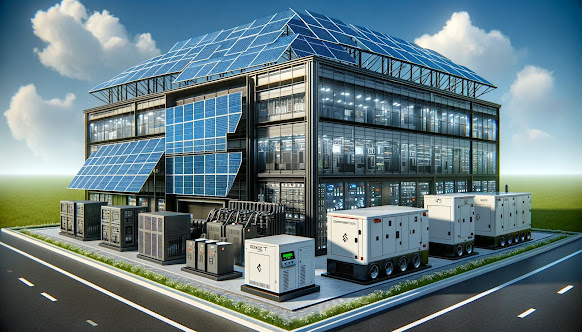In the rapidly evolving landscape of communication infrastructure, ensuring uninterrupted power supply is paramount. Communication buildings, housing critical equipment and data, require efficient power backup systems to safeguard against outages and maintain seamless operations. In this article, we delve into the world of power backup systems, exploring their types, benefits, and best practices for implementation.
Types of Power Backup Systems
1. Uninterruptible Power Supply (UPS)
Uninterruptible Power Supply (UPS) systems are a cornerstone of reliable power backup in communication buildings. These devices provide instantaneous power during electrical interruptions, bridging the gap between the main power source and alternative energy solutions.
UPS units come in various types, including:
- Online UPS: Continuously supplies power, ensuring no downtime during switchover.
- Offline UPS: Switches to battery power only when the main supply fails.
- Line-Interactive UPS: Offers improved voltage regulation, ideal for areas with unstable power grids.
2. Generators
Generators serve as a robust backup solution for extended power outages. They can be powered by various fuels, such as diesel, natural gas, or propane, providing flexibility to communication building operators. Generators are particularly useful for maintaining critical systems during prolonged blackouts.
3. Solar Power Systems
Harnessing solar power is an eco-friendly and sustainable approach to backup power generation. Solar panels can be installed on the roof or around the building to capture sunlight and convert it into electricity. This renewable energy source reduces operational costs and environmental impact.
Benefits of Efficient Power Backup Systems
Implementing efficient power backup systems in communication buildings offers several key advantages:
1. Minimized Downtime
Power outages can disrupt communication services, leading to financial losses and customer dissatisfaction. Efficient power backup systems, such as UPS and generators, ensure uninterrupted operations, minimizing downtime and revenue loss.
2. Data Protection
Communication buildings house valuable data and equipment. Power surges or outages can result in data corruption or hardware damage. Backup systems safeguard against such risks, preserving data integrity and equipment longevity.
3. Business Continuity
In today's interconnected world, uninterrupted communication is crucial for business continuity. Efficient power backup systems enable organizations to maintain critical operations even in adverse conditions, enhancing overall resilience.
4. Cost Savings
While initial investments in backup systems may seem significant, they lead to long-term cost savings. Reduced downtime, minimized equipment damage, and energy-efficient solutions contribute to a positive return on investment.
Best Practices for Implementing Power Backup Systems
To maximize the effectiveness of power backup systems in communication buildings, consider the following best practices:
1. Comprehensive Assessment
Begin with a thorough assessment of your communication building's power needs. Identify critical systems and prioritize them for backup power supply.
2. Redundancy
Implement redundancy in your backup systems. Combining UPS, generators, and solar power can provide layers of protection against power interruptions.
3. Regular Maintenance
Schedule routine maintenance for all backup systems to ensure they remain in optimal working condition. Neglecting maintenance can lead to failures when you need them the most.
4. Monitoring and Testing
Install monitoring systems to keep track of power usage and performance. Regularly test backup systems to verify their functionality and address any issues promptly.
5. Scalability
Design your backup power systems with scalability in mind. As your communication building expands, ensure that your backup systems can accommodate increased power demands.
In conclusion, efficient power backup systems are indispensable for communication buildings aiming to maintain uninterrupted services and protect valuable assets. By implementing a combination of UPS, generators, and solar power solutions while following best practices, you can ensure your communication building remains resilient in the face of power challenges. Investing in reliable power backup systems is an investment in the future success and sustainability of your communication infrastructure.
In our comprehensive exploration of efficient power backup systems for communication buildings, we've uncovered the critical importance of safeguarding against power interruptions to ensure seamless operations and data protection. To implement these vital systems effectively, it's essential to partner with experts who specialize in providing top-tier solutions tailored to the unique needs of the communications industry.
That's where Alan Campbell Engineering Services comes in. With their expertise and dedication to excellence, they offer a wide range of specialist battery backup systems specifically designed for the communications sector. By visiting their website, you'll gain access to cutting-edge solutions and the knowledge needed to ensure your communication building remains resilient in the face of power challenges. Don't compromise on the integrity of your operations; trust the experts at ACES for all your power backup needs.

Comments
Post a Comment